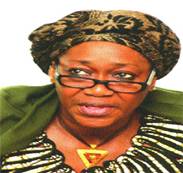Exclusive, Top Stories, Photo News, Articles & Opinions |
|---|
EFCC Clears Obasanjo, Ibori, Odili, Orji, Others ...Says Case Files Missing |
|||||
|---|---|---|---|---|---|
EFCC CLEARS OBASANJO, IBORI, ODILI, ORJI, OTHERS …SAYS CASE FILES MISSING. The chairman of the Nigeria’s Economic and Financial Crimes Commission, EFCC, Farida Waziri, yesterday reinforced the growing apathy and waning interest in transparent civil governance in the world most populous black nation by looking her country men in the eye and arbitrarily declaring that accused corrupt Governors and other top elected officials have no case to answer.
Waziri whose appointment was greeted with wide spread Sinicism in the wake of an allegation of being brought in to unravel the succeeding war on corruption by her predecessor, Mallam Nuhu Ribadu shocked the entire world when she said in Abuja that the case files on 31 Governors and proven evidence of money laundry and embezzlement of public funds were missing and that some of the allegations were exaggerated. The EFCC boss who rode into office on the back of the Minister of Justice and Attorney General of the Federation, Michael Aondoakaa, a man viewed with suspicion by the international community as being comfortable with the culture of corruption, did not disappoint watchers of Nigeria’s event in not waiting for the due process of law before acquitting and discharging the officials which includes former President Olusegun Obasanjo. By implication, Waziri have cleared Chief James Ibori (Delta), Chief Orji Kalu (Abia), Chief Lucky Igbinedion (Edo), Dr. Chimaroke Nnamani ( Enugu), Mr. Ayo Fayose (Ekiti), Chief Joshua Dariye (Plateau), Mr. Jolly Nyame (Taraba), Alhaji Saminu Turaki (Jigawa), Mr. Boni Haruna (Adamawa), Peter Odili (Rivers) whose cases were widely known all over the world. Waziri, who was reacting to a question put to her during the roundtable discussion of The Initiatives, a group of lawmakers in the House of Representatives said apart from having no case against Obasanjo, most of the case files on top political office holders, particularly former state governors contained no vital evidence to prosecute them.
Foreclosing the possibility of investigating any corrupt allegations against Chief Obasanjo, Mrs. Waziri insisted that the commission had nothing against the former president. Because of the absence of those vital documents, she explained that it was difficult for the commission to start prosecuting the former governors. The EFCC boss admitted that there was enough time for the former governors to cover their tracks, adding that some of the documents that could be used as evidence against them were not available in the commission. The EFCC boss told Nigerians who were eager to see past rulers in the dock that the commission could not prosecute anybody without petition against such person. She therefore urged members of the public to help the commission by coming up with petitions against corrupt leaders. She promised that the commission would protect the identity of any petitioner. -------------------------------------------------------------
|
|||||
|
|
